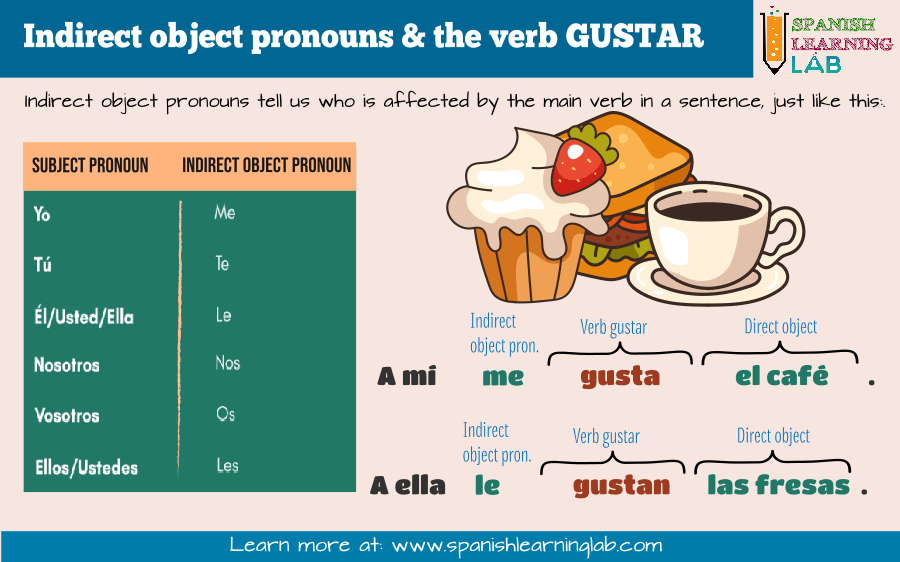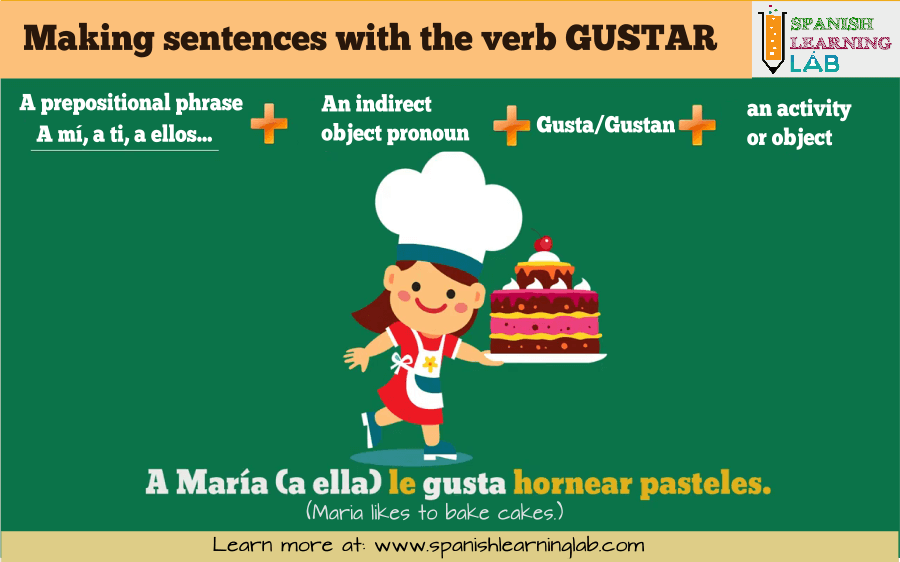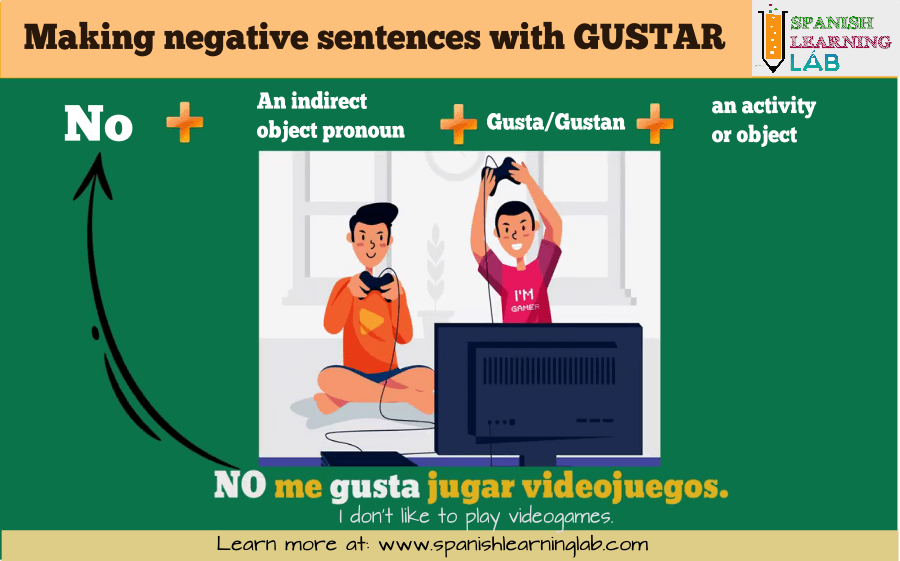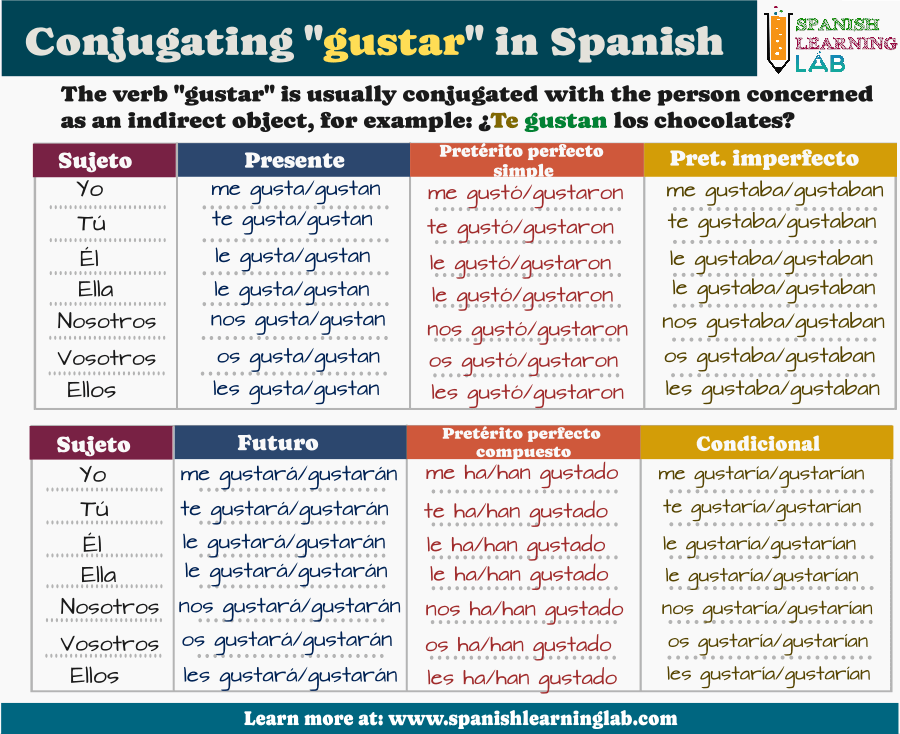¡Bienvenido! Thank you for joining us again and learning Spanish with us. This time, we will cover the rules for conjugating the verb “GUSTAR” in Spanish in different tenses, starting with the present tense. This lesson includes many examples and interactive exercises to help you get the most out of this topic. Let’s begin…
Conjugating the verb GUSTAR in the present tense
First, the verb “GUSTAR” is an essential verb to talk about hobbies or activities we enjoy. Unlike other verbs, the verb “gustar” is generally accompanied by an indirect object pronoun that indicates who is affected by the action of the verb, that is, it specifies who likes or dislikes something in particular. Pay attention to the image below:

As you can see in the image, indirect object pronouns are words like “me, te, nos, os, le (s)” that are directly related to a personal pronoun, although this relationship isn’t explicitly expressed in the sentences. Instead, we can use a prepositional phrase like “A mí, a ti, a vosotros,” etc. before the indirect object pronoun, although this is optional, for example:
- A mí me gusta el café. (In this case, the indirect object pronoun “me” indicates that it is me who likes coffee.)
- A ella le gustan las fresas. (Likewise, we use the indirect object pronoun “le” because it is the correct one to refer to “ella”)
Interactive quiz No. 1
Complete the sentences with the correct indirect object pronouns for these sentences with the verb “gustar”
Making sentences with the verb GUSTAR
Generally, the verb “GUSTAR” is conjugated as “gusta” in Spanish when it precedes a singular noun like “la música” or “el vino,” and it is conjugated as “gustan” when referring to plural nouns like “las frutas” or “los gatos.” Furthermore, prepositional phrases like “a nosotros” are optional. Pay attention to these example sentences:
|
A mí me gusta jugar fútbol.
I like to play soccer.
|
|
A ti te gusta bailar y hacer ejercicio.
You go to the pool with me.
|
|
A ella le gusta cuidar de las plantas.
You like to dance and exercise.
|
|
A nosotros nos gusta tomar fotografías.
We like to take photographs.
|
|
A vosotros os gusta escuchar música.
You like to listen to music.
|
|
A ellos les gusta pescar y cocinar.
They like fishing and cooking.
|
|
Me gustan los tiburones.
I like sharks.
|
|
Te gustan los conciertos en vivo.
You like live concerts.
|
|
Os gustan los viajes de placer.
You like to travel for fun.
|
|
Les gustan los fuegos artificiales.
They like fireworks.
|
In the first six sentences above, prepositional phrases like “A mí,” “A ti,” “A nosotros,” etc., before each indirect object pronoun help to emphasize who likes something. Additionally, we can replace these prepositional pronouns “mi, ti, usted” with someone’s name. This way, instead of saying “A ella,” we can say “A María,” for example:

|
A mí me gusta jugar beisbol.
I like to play baseball.
|
|
A Nicolás le gustan los deportes extremos.
Nicolás likes extreme sports.
|
|
A nosotros nos gusta andar en patineta.
We like to skateboard.
|
To make negative sentences, we will use the adverb NO before the indirect object pronoun to say what hobbies, objects or people we do not like, for example:

|
No me gusta el fútbol americano.
I don’t like American football.
|
|
A vosotros no os gusta tocar la guitarra.
You don’t like to play the guitar.
|
| A ellos no les gustan las serpientes. They don’t like snakes. |
Interactive quiz No. 2
Read the clues and write complete sentences using the verb GUSTAR in Spanish.
Conjugating the verb GUSTAR in other tenses in Spanish
The verb GUSTAR, like many other verbs in the language, can be conjugated following the rules for regular verbs ending in -AR, such as “amar.” However, it is much more common to conjugate this verb using an indirect object pronoun in most tenses. Keep in mind that the rule of using two forms, such as “gusta” and “gustan,” also applies to other tenses, except for tenses such as the present perfect, for which we will use “HABER” as “ha” or “han,” and conjugate “gustar” as “gustado” in the participle. The image below shows how to conjugate “gustar” in the most common tenses in Spanish using indirect object pronouns:

As you can see in the image, the verb “gustar” is normally used in two forms in each tense, depending on the number of items we like. Indirect object pronouns are always associated with the person affected by the action, and this will not change regardless of the tense you use. Read and listen to a set of sentences with the verb “gustar” in different tenses in Spanish:
|
A mí me gustó mucho la película, ¿y a ti?
I really liked the movie, and you?
|
|
A Sandra le gustaron todas tus ideas para el diseño del producto.
Sandra liked all your ideas for the product design.
|
|
Cuando era niño, no me gustaba andar en patineta ni montar mi bicicleta.
When I was a kid, I didn’t like skateboarding or riding my bike.
|
|
A ti te gustaban mucho las historietas de superhéroes.
You really liked superhero comics.
|
|
Estoy seguro de que a Alberto le gustará tu regalo de cumpleaños.
I’m sure Alberto will like your birthday present.
|
|
¿Crees que a los niños les gustarán estos juguetes?
Do you think children will like these toys?
|
|
¡Bueno! Me ha gustado mucho lo que habéis presentado hoy chicos.
Well! I really liked what you guys presented today.
|
|
¿A vosotros no os han gustado los aperitivos?
Didn’t you like the appetizers?
|
|
A nosotros nos gustaría aprender más sobre tribus indígenas.
We would like to learn more about indigenous tribes.
|
|
A ustedes les gustarían todos los platillos deliciosos de Osaka.
You guys are going to plan the party next week.
|
Interactive quiz No. 3
Drag the forms of the verb gustar to the correct blue spaces to complete these sentences.
